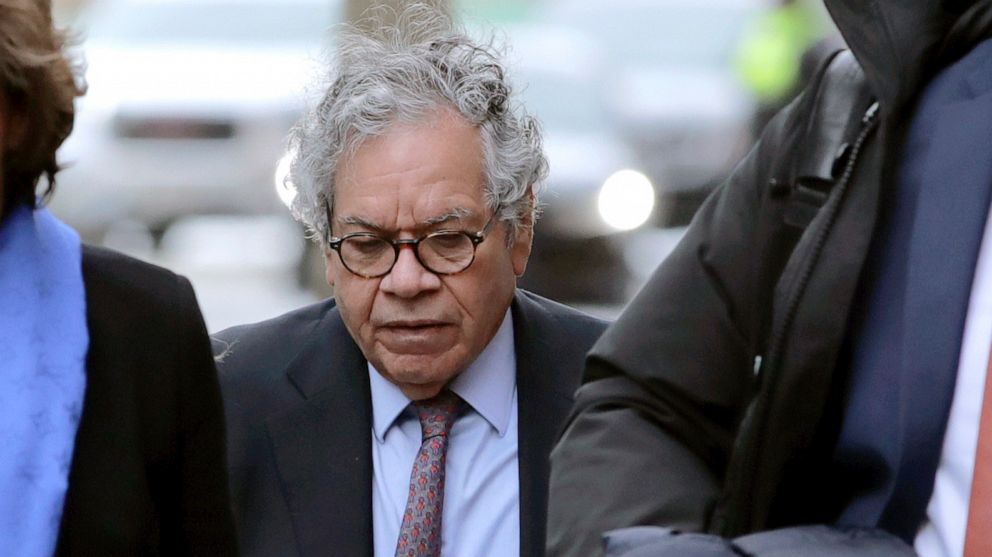Insys founder John Kapoor sentenced for role in fraud, bribery scheme that contributed to opioid crisis
John Kapoor, the billionaire founder and former chairman of Insys Therapeutics Inc., was sentenced to five-and-a-half years in prison and ordered to pay a $250,000 fine for his role in a fraud and bribery scheme that contributed to the nationwide opioid crisis in the United States.
Kapoor, 76, is one of the highest-ranking pharmaceutical executives to face trial and prison time amid the U.S.'s opioid epidemic.
Watch the full story on "Nightline" tonight at 12:35 a.m. ET on ABC.
"The message to the industry and to executives is that they're going to be held accountable for their crime in a way that in the past they have not," prosecutor Nat Yeager said during a press conference after Kapoor's sentencing on Thursday. "I hope that the judge is right and that the entire industry is watching and thinking about what happened to the defendants in this case."
Dave Lazarus, another prosecutor, said Thursday that he would have liked to see higher sentences, but that he "respects that the judge did what she thought was appropriate."
"These were people who needed to be held accountable, and it needed to be in a meaningful way," Lazarus said.
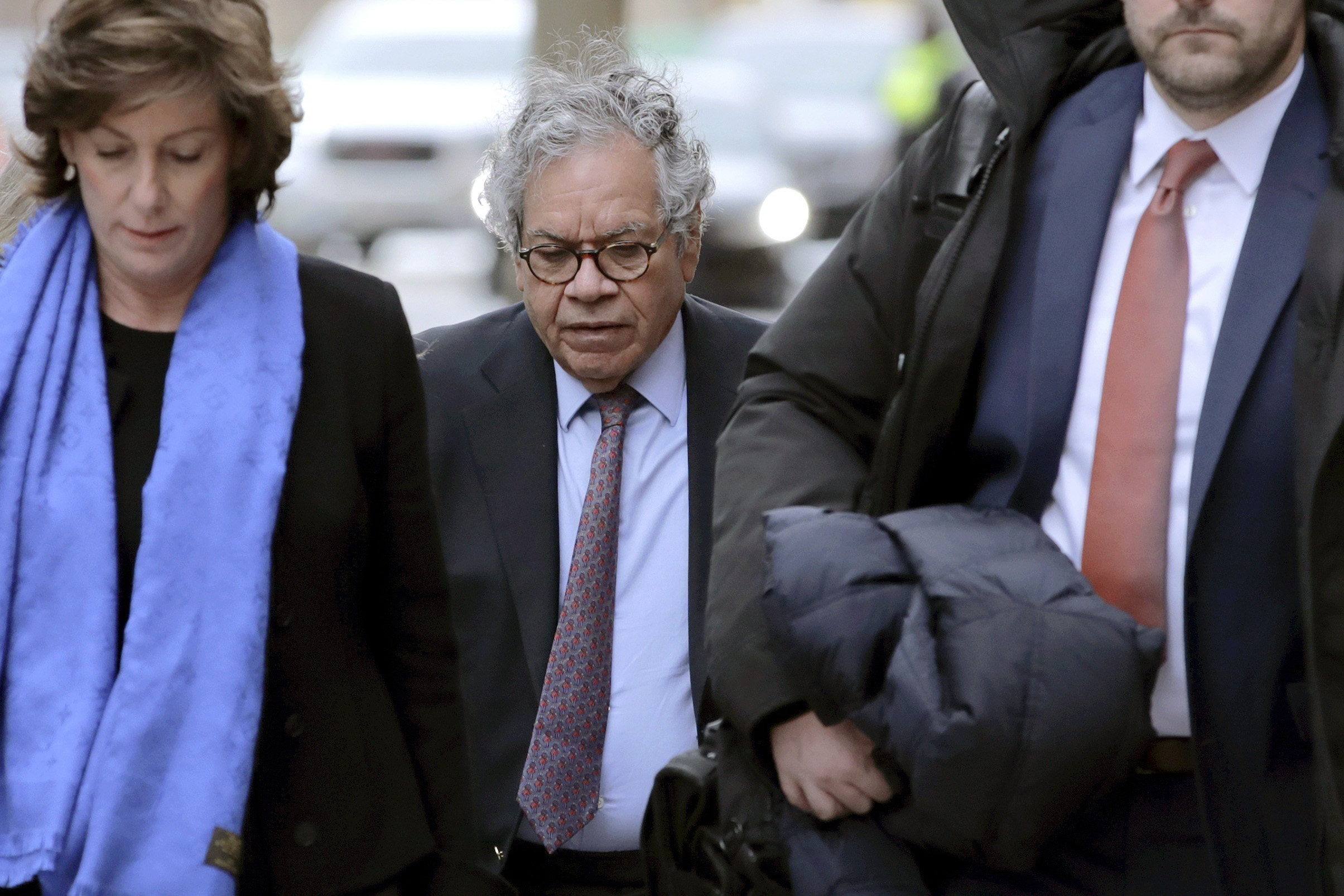
In May 2019, a federal jury in Boston found Kapoor guilty of federal racketeering conspiracy charges for his role in an elaborate nationwide scheme to bribe doctors to prescribe the company’s highly addictive opioid medication SUBSYS. Federal prosecutors also claimed that the scheme defrauded insurance companies into paying for the drug.
“Dr. Kapoor is disappointed in the verdict, as are we,” defense attorney Beth Wilkinson said after the verdict, according to Bloomberg. “Four weeks of jury deliberations confirm that this was far from an open-and-shut case.”
Kapoor’s four co-defendants, all of whom are former Insys executives, were also found guilty of racketeering conspiracy for their roles in the scheme.
A federal criminal indictment and hundreds of lawsuits accused them of coaxing doctors with money and sexual favors to prescribe SUBSYS -- a U..S. Food and Drug Administration-approved fentanyl spray specifically for severe cancer pain -- to thousands of patients who did not have cancer. Then, according to prosecutors, Insys "put profits over people," defrauding insurance companies to have them pay for it.
Former Insys vice president of managed markets Michael Gurry was sentenced last week to 33 months in prison and three years of supervised release and ordered to forfeit $3.6 million -- much less than the 11 years in prison that prosecutors sought.
"From May 2012 to December 2015, Gurry and his co-defendants conspired to bribe practitioners, many of whom operated pain clinics, in order to induce them to prescribe Insys’ fentanyl-based pain medication, Subsys, to patients, often when medically unnecessary," the government said in a press release announcing Gurry's sentencing.
The company’s former CEO Michael Babich pleaded guilty in federal court in January 2019 to conspiracy and mail fraud charges after striking a plea deal with prosecutors. Former vice president of sales Alec Burlakoff also struck a deal with prosecutors and pleaded guilty in federal court to racketeering conspiracy.
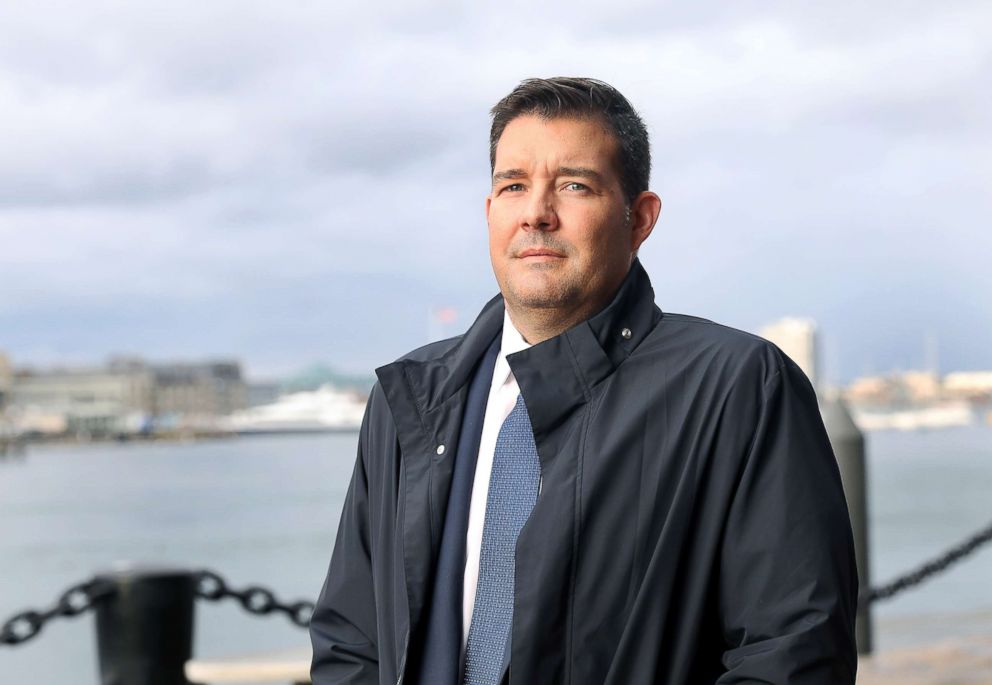
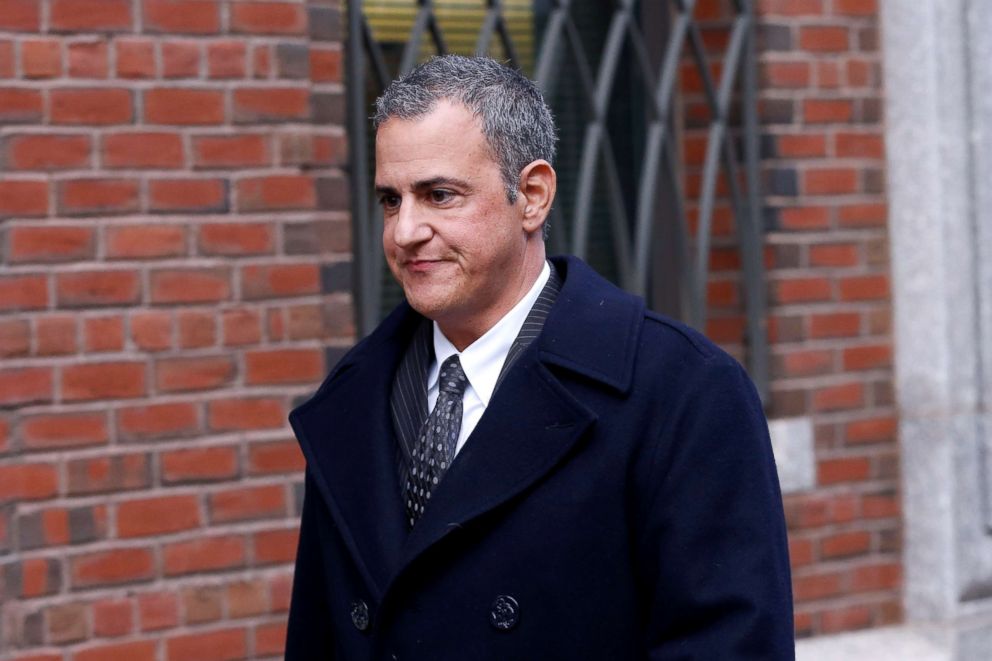
One of the people who attended Kapoor's sentencing in Boston was decorated war veteran Jeffrey Buchalter, who said his reaction to the sentencing was mixed.
"I got some satisfaction knowing that he's going to jail for a number of years," Buchalter said, adding that it was "not as long as I would hope for."
"Justice, I don't think can ever be served for the victims in this case because we are all going to contend with lifelong issues -- addiction. I deal with pain issues, and then those that lost their lives," he continued.
Buchalter was hit with multiple improvised explosive devices (IEDs) over the course of three combat tours in Iraq -- the worst of which left him with nearly a broken back. But he survived.
And yet, he said he found himself closest to death back home while under the care of a doctor who prescribed him SUBSYS.
“I missed some of the best years of my kids' life,” Buchalter told “Nightline” in an interview last year, referring to the years he says the powerful fentanyl spray consumed his life. “I can't get that back.”
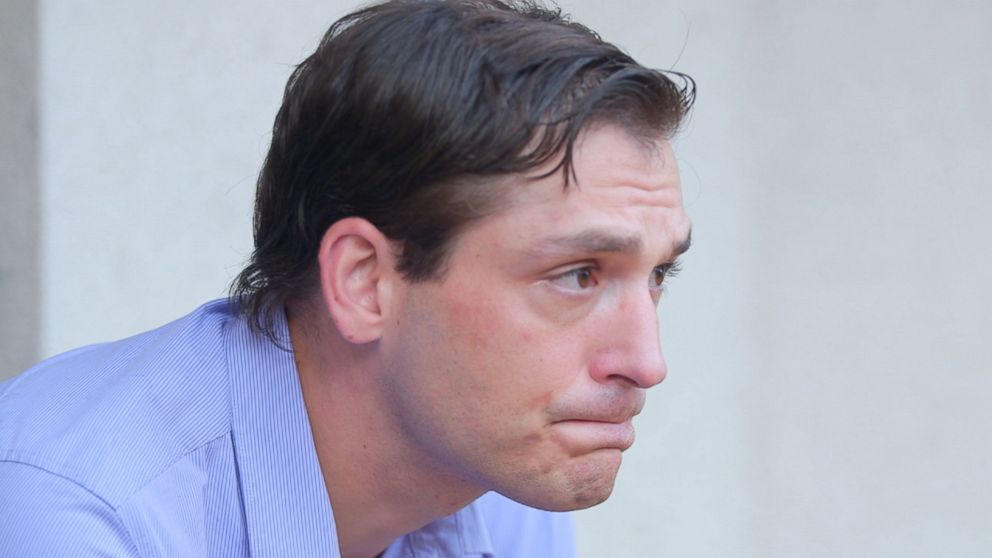
Buchalter, along with Patty Nixon, a former employee of Insys, and Richard Hollawell, a small-town attorney on a crusade against the company, had found a common cause in attempting to hold Insys responsible for what they said was its role in the opioid crisis.
According to the Centers for Disease Control and Prevention (CDC), there were 47,000 opioid deaths reported in 2017 and more than a third of those were caused by prescription medications. Yet, no pharmaceutical executive has ever been convicted in a criminal case until now.
More than 7,000 deaths have been reported of people who were taking SUBSYS -- all of whom were patients who didn’t have cancer but were prescribed the drug anyway -- according to the FDA's Adverse Events Reporting System. Fentanyl is up to 50 times more powerful than heroin, according to the CDC.
“Makes you wonder why they're not charged with homicide,” Buchalter said.
During his military service, Buchalter said he was exposed to 14 IED blasts that left him with significant spinal injuries. He ended up at Walter Reed National Military Medical Center in Bethesda, Maryland.“The vertebrae had slipped off each other,” he said. “And the back was actually in jeopardy of sliding off and causing paralysis, if not worse.”
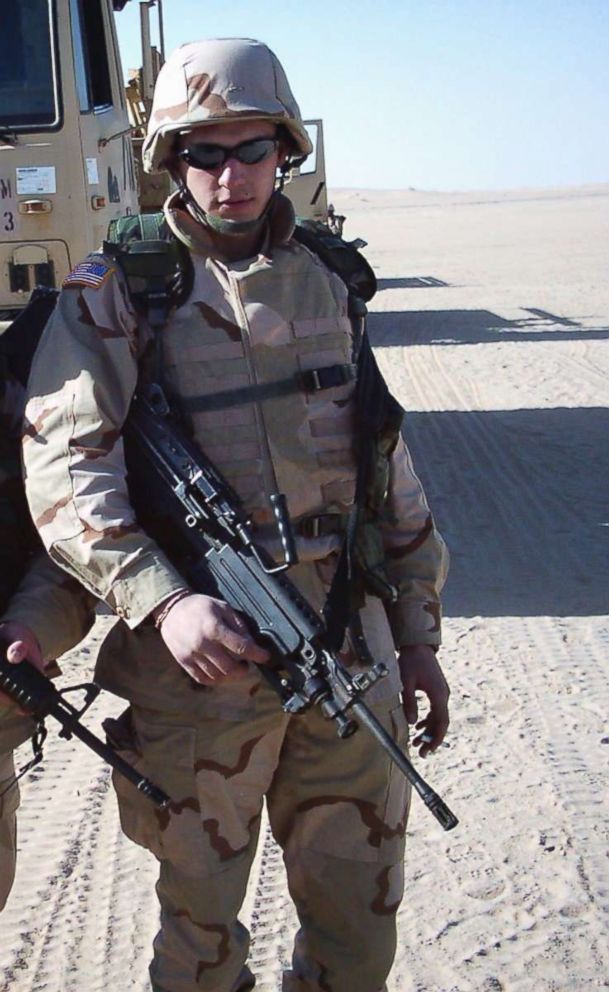
Still, Buchalter flourished. He got married and he and his wife settled down in Maryland and started a family. Being a dad meant “everything” to him, he said.
“It's the strength that you need when you don't feel like there's anything else that'll give you the motivation to be the better version of yourself,” Buchalter said.
But he said there were moments when the pain from his spinal injuries was unbearable. He was prescribed Percocet, oxycodone and a host of other prescription painkillers.
“I don't think there's one I haven't been on,” he said, acknowledging that he became addicted to opiates.
“I would say that I was taking more than I ever should have,” he added.
Buchalter said a simple fall, an injury or sleeping in a bad position would cause his back to flare up.
“At that point, [the pain was] a 10 out of 10,” Buchalter said. “It would be ungodly. I couldn't move, had difficulty walking and when that would happen, I'd always have to go to the emergency room to get treated for acute pain.”
In 2010, Buchalter thought he had found a better approach when he was introduced to a new doctor: Dr. William Tham, a pain specialist in Annapolis, Maryland.
According to Buchalter, Tham told him, "There's this new medication that I think will keep you out of the emergency room." That medication was SUBSYS, which patients spray and hold under their tongue for up to a minute.
SUBSYS was FDA-approved specifically for severe cancer pain. But Buchalter and thousands of other patients like him were prescribed the drug “off-label,” meaning that the medication is being used in a manner not specified on the FDA-approved packaging label for the drug, according to the FDA. It’s a legal and common practice for many prescription medications but tightly regulated for powerful opiates.“This is a very narrow drug,” attorney Richard Hollawell told “Nightline” last year. “This is approved for one reason only…and that's breakthrough cancer pain.”
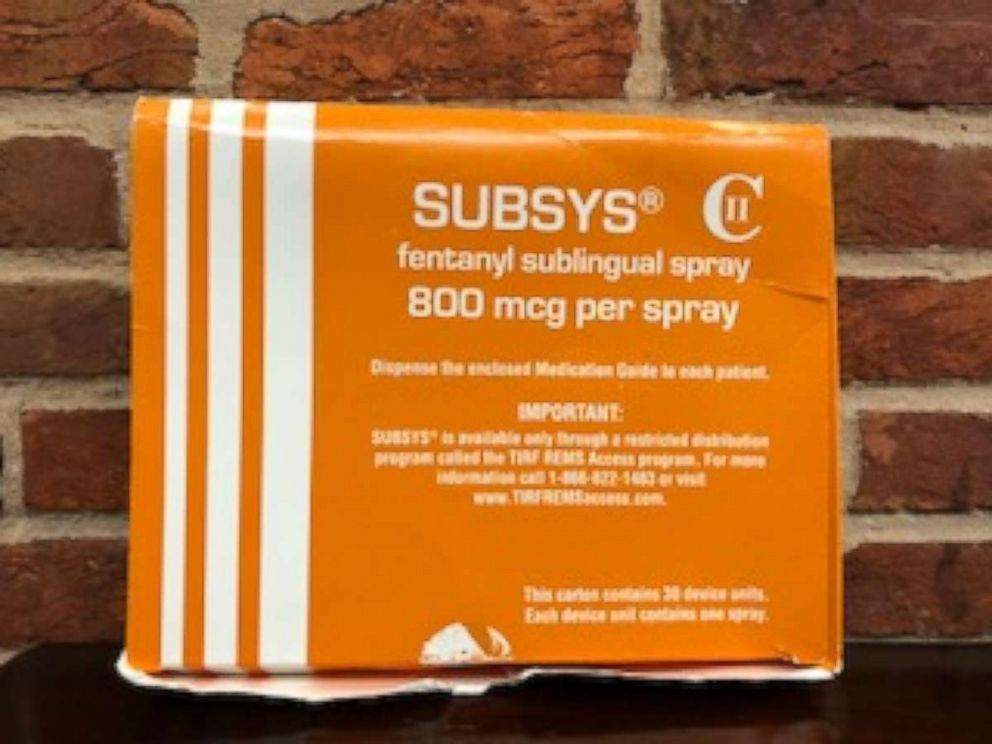
But it didn’t matter if patients had cancer pain, Patty Nixon, a former Insys employee told “Nightline” last year. Nixon’s role at Insys, she said, was getting insurance companies to sign off on payments for SUBSYS prescriptions. It was one part of the alleged years-long scheme that cheated millions of dollars from insurers, including Medicare. According to Nixon, only around 10% of patients for whom she helped to get prior authorization for insurance payments actually had cancer.
What mattered, Nixon said, was for patients to be insured so that Insys employees could make sure those SUBSYS prescriptions were paid for.
Nixon claimed that her employer was “asking me to lie to insurance companies about patients having cancer and breakthrough cancer pain.”
“I was in a very small office in Chandler, Arizona, and I would call Alaska and say I was from Alaska… Sometimes I was from Hawaii,” Nixon said. “Wherever the patient was from and wherever the doctor was located.”
Nixon said the lies were all based on a script that she would read over the phone, which Insys executives instructed her to follow when speaking to insurance companies. They called it “The spiel.”
“A lot of it was word games,” she continued. “When the insurance company would ask the question… ‘Does the patient have cancer with breakthrough cancer pain?’ And when we would respond, we would say, ‘Yes, we're treating the breakthrough pain.’ … So it's eliminating the word cancer.”
The National Cancer Institute describes breakthrough cancer pain as when a cancer patient, who may already experience chronic pain, has a sudden increase in pain or a severe flare-up.
One day, Nixon said she “had a particular chart with an insurance company that I was having difficulty getting approved,” so she went to her boss.
“And she grabbed a sticky note and she wrote down 787.20 and she handed it to me and said, ‘That's for difficulty swallowing. Put that on every single chart and you won't have any problems,’” Nixon said, even if it wasn’t true.
Nixon said she started learning about the patient deaths through her own research.
“I found that people had passed away. Sarah Fuller is a patient that had passed away,” Nixon said. “I feel like if I would have spoken up sooner then maybe I could have saved her life. I'm sorry.”
“I don't think people really understand what it's like to live with this,” she continued. “It's not easy to sit here and have this interview with you. But I still have my voice and they don't.”
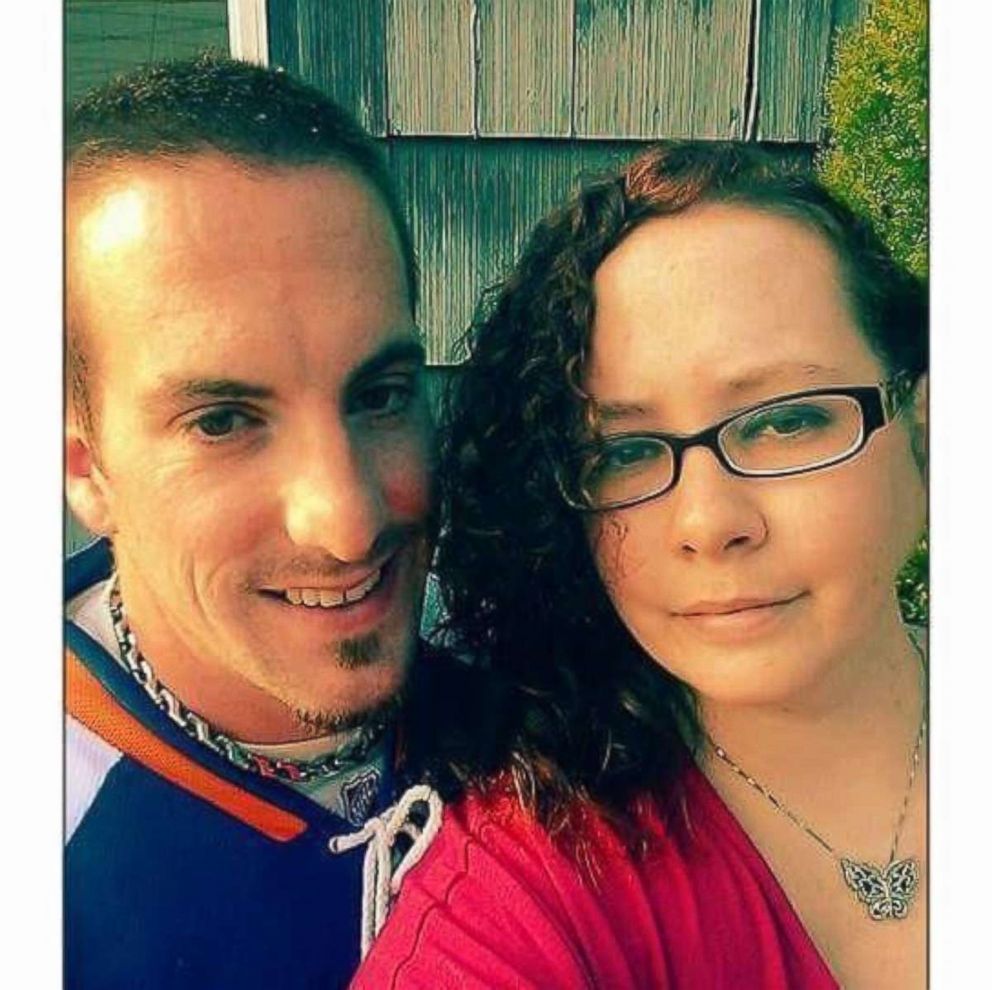
Sarah Fuller was a 32-year-old New Jersey woman who had been battling chronic pain after a series of car accidents. When treatments left her struggling with opioid addiction, she turned to New Jersey family physician Dr. Vivienne Matalon.
Fuller’s mother, Deborah Fuller, told “Nightline” last year that she said to Matalon, “Sarah is addicted to painkillers. So when you deal with her chronic pain, you gotta find another avenue, like maybe yoga or something like that, or physical therapy. Something that isn't drugs.”
But Deborah Fuller said Matalon disregarded the family’s plea. During a January 2015 appointment, Sarah Fuller was prescribed SUBSYS -- an appointment that Deborah Fuller said was accompanied by an Insys sales rep.
The following day, according to court documents, that Insys sales rep texted her manager about how to get Matalon into the Insys speakers program, which federal prosecutors allege was a bribe to get doctors to prescribe SUBSYS.
Federal prosecutors alleged that Insys began the speakers program to increase brand awareness due to its dissatisfaction with sales after only three months on the market.
These programs, hosted by pharmaceutical companies, are legal and are commonly held to teach doctors about new medications. But in the case of Insys, prosecutors argue that the company conceived its program as a front for bribes.
“One of the things that they do is they identify medical providers [and] physicians that are high prescribers of opioids in general. Pain-management doctors, not oncologists,” Hollawell said.
Tham, the pain specialist who treated Buchalter, was allegedly part of Insys’ speaker series. He received at least $55,000 from Insys between 2013 and 2016, according to the Centers for Medicare and Medicaid Services’ (CMS) Open Payments database. Open Payments is CMS’ national transparency program that collects and publishes information about financial relationships between the health care industry (drug companies) and health care providers (doctors, hospitals).
“They [Insys] were setting up sham speaking events,” Hollawell said. “It was just a means to have a fancy dinner and act like that they were putting on an educational event that was legitimate.”
A 2016 complaint filed by states attorneys general on behalf of 24 states said Insys promised one physician a $100,000 payment for his “support with Subsys” and that “Insys spent $58,000 on meal expenses for doctors in just one month.”
Those meals were often accompanied by sales reps like Amanda Corey Emhof, a former reality show participant who had appeared on TV’s “Beauty and the Geek” and one episode of “Judge Judy,” as well as modeled for Playboy.
In a statement to ABC News this week, Emhof said: “I really just wanted to defend my character as I was portrayed as someone that Insys only hired because I was a former model and allegedly unqualified for the position. The truth is I was on a reality show in 2008 on a family-friendly network, CW (“Beauty and the Geek”), and modeled for the iconic magazine Playboy in 2011. What the story failed to mention is I also hold a B.A. degree from the University of Arizona, a substitute teaching credential for grades K-8 and was the owner and operator of a modeling/talent agency from 2009-2018. All of this information was discussed during my interview with Insys. My former modeling career during my interview was never mentioned. I feel I was used as a scapegoat in order to gain momentum for your story as nothing about what made me qualified for the sales position was mentioned.”
Evidence shows Insys routinely employed sex appeal to drive prescriptions, according to prosecutors.
"I have never seen such in-your-face, such egregious, blatant behavior... Hiring drug reps that had no industry experience whatsoever. Strippers. Just people that didn't have college degrees, had no understanding of the FDA and regulations," Hollawell said.
Sunrise Lee, who worked for Insys as a regional sales manager, was accused of giving a doctor a lap dance in a Chicago nightclub in 2012, according to witness testimony.
“She never worked in the pharmaceutical industry,” Hollawell said. “And they're bringing somebody in that was an exotic dancer and ran an escort service to sell a product that could kill somebody with one prescription. And that was their M.O.”
Lee has denied the allegations, stating through an attorney that the witness “admitted to being intoxicated.”
Socializing with doctors was a corporate strategy. One 2012 email from Insys' then-vice president of sales Alec Burlakoff shows him pressuring his staff in one of his many directives, according to a report by the U.S. Homeland Security and Government Affairs Committee.
One line reads: “How do I transition from the doctor viewing me as ‘the Subsys representative’ to ‘Alec -- my friend in pharmaceuticals’?"
Another: "Have I really FORCED myself to step ‘outside’ of my comfort zone?"
And another: "If you have not found a way to spend time with your customers OUT OF THE OFFICE AND NOT IN A RESTAURANT it’s simply not good enough."
It seemed to work. Between 2012 and 2013, Insys saw more than 1,000% growth in net revenue of SUBSYS sales -- the best performing initial public offering of the year. The following year, SUBSYS became the most widely prescribed drug of its type.
By then, Kapoor, a soft-spoken immigrant from India, had become a billionaire. By 2015, he was on Forbes’ annual “Richest People in America” list.
All the while, Kapoor was hailing his drug as a win for patients and shareholders alike. Speaking at the annual tech conference TiEcon in 2015, Kapoor told the audience, “That product [SUBSYS] that we launched three years ago will do close to $300 million.”
“All these changes create a product the patients want and in two to three years our market share is approaching 50% of the market,” Kapoor said in that same speech.
At an Insys national sales meeting in 2015, the company played a crude five-minute rap music video celebrating their success. The video showed Burlakoff in a fentanyl spray bottle costume while two young Insys salesmen danced in sunglasses and hoodies. Some of the lyrics included, "I got new patients and I got a lot of them" and “We’re raising the bar and we’re changing the game. To be great, it takes a decision to be better than the competition.”
Meanwhile, patients like Sarah Fuller and Buchalter were edging closer to death.
Hollawell, the Fuller family's attorney, said he got a subpoena for the recording of a phone call that an Insys employee made to Fuller's insurance company pretending to be from Matalon's office.
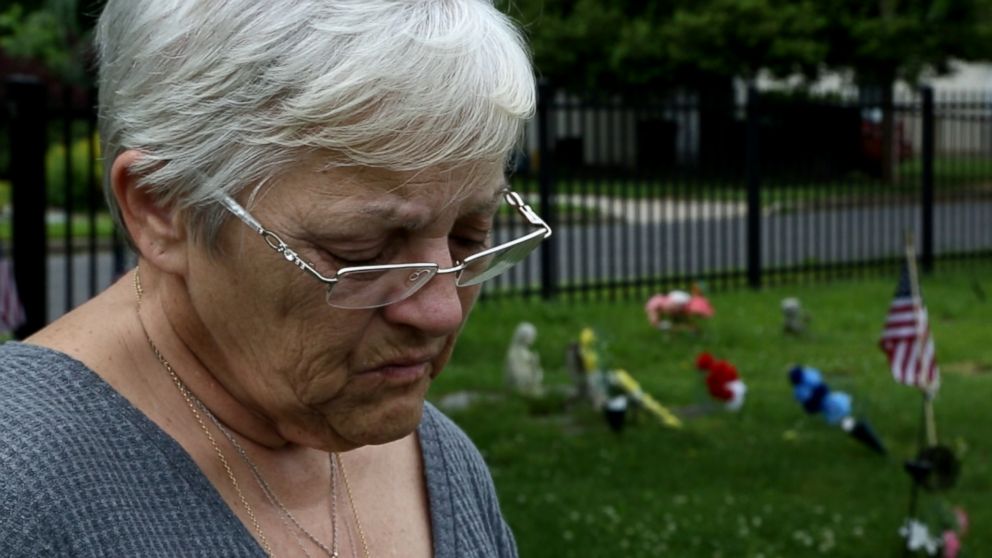
“That’s [what] I would call... the murder weapon, the smoking gun, all those terms,” Hollawell said. “If they did not make that call, she would've never been approved for the drug, and you heard all the misrepresentations that were made.”
In the recording, the Insys rep is heard telling the insurance rep that the doctor was treating Fuller “for breakthrough cancer pain.”
"Let me look here... Medication intended for the management of breakthrough cancer pain," the Insys rep said, misrepresenting Fuller's diagnosis.
A carton of SUBSYS was eventually delivered monthly to Sarah Fuller’s door. Over time, her mother said, Sarah became “extremely lethargic. Her complexion, pale.”
“It was literally killing her,” Deborah Fuller said.
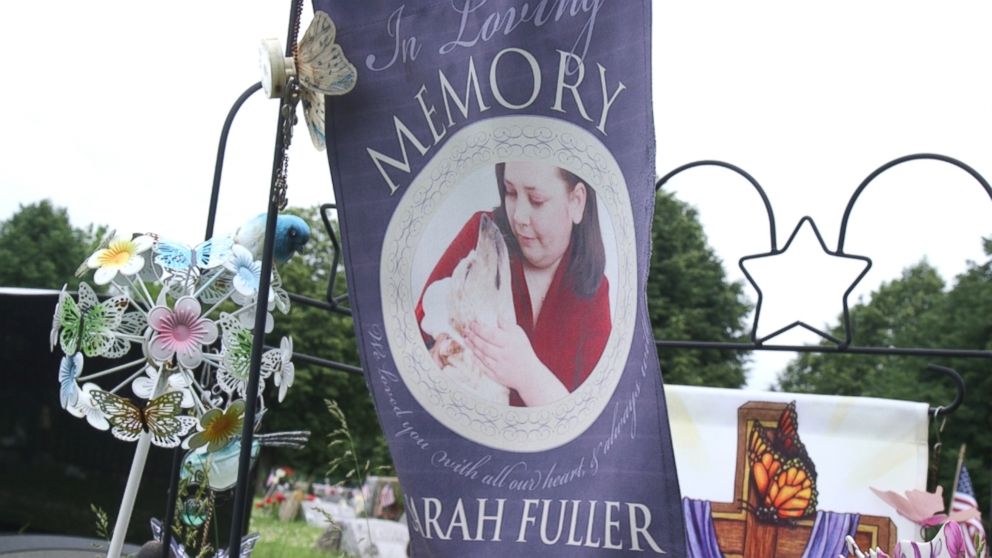
Sarah Fuller died nearly 15 months after starting on SUBSYS. At the time she had been planning her wedding, but she never made it to her wedding day.
“[On] her wedding day we all met here [at Sarah’s grave site], her fiance, us, and everybody left something,” Deborah Fuller said. “My daughter and I brought wedding balloons. My husband brought a wedding topper and two champagne flutes. Her fiance left a bouquet of flowers.
“And it was just really surreal because we should be in a church watching her walk down the aisle and go to a great reception. But that's not how it happened,” she continued.
On Thursday, Deborah Fuller called Kapoor's sentence "a disgrace because they all got away with murder. She said her daughter and others affected by the scheme "deserve justice and I don't think we got it."
Hollawell said he was "shocked" and "disappointed" with Kapoor's sentence, adding that he expected a longer one.
"The magnitude of the conduct that was involved. We are in an opioid epidemic and people are dying every day. People are becoming addicted," Hollawell said Thursday. "This is the most powerful drug out there -- fentanyl -- and it was treated like financial fraud, accounting fraud. So I am deeply disappointe
The Fuller family has also sued Insys and Matalon for negligence and wrongful death.
In May 2018, the New Jersey Board of Medical Examiners revoked Matalon’s license. The Fuller family and Matalon, who claimed she was misled by sales reps about using SUBSYS to treat Sarah Fuller, reached a settlement for an undisclosed sum without admission of wrongdoing.
In a statement to ABC News last year, Insys declined to comment on ongoing litigation, but said that it “in no way defends the past misconduct of former employees and is fully cooperating with the government. … Last year, Insys further announced its intention to divest its opioid business and focus its efforts on non-opioid drugs."
The company would only acknowledge in its statement that, "as of Jan. 1, 2019, there have been 951 cases of patients who passed away while on, or having been suspected to have been on SUBSYS. The majority of those cases were assessed as not related to the use of SUBSYS, or having insufficient information to make a causal assessment. As SUBSYS is approved for the treatment of breakthrough cancer pain, to say these deaths are ‘associated with the use of SUBSYS’ is both inaccurate and misleading.”
Nixon told “Nightline” last year that she remains consumed by guilt and regret for her role in exposing SUBSYS to countless patients. She testified before a grand jury that indicted Babich.
“It was scary. I mean, I had to tell the truth, I had to tell what my job was and what I did. And what I did was illegal. So that was really scary. I wasn't sure what was gonna happen to me,” Nixon said. “I didn't ask for any plea deal... I'm not trying to profit from this in any way, shape or form.”
As for Buchalter, he told "Nightline" last year that his life was wrecked by SUBSYS. He said he had a so-called “come to Jesus moment” when he ended up in the emergency room, again in severe pain and with sterile abscesses in both legs. He said the ER staff “refused” to give him the dosage of pain medication that he’d told them he’d been prescribed.
“The nurses were scared to death to give me those doses,” he added.
By that point, Buchalter said he was taking so much of the fentanyl-based SUBSYS spray that it was equal to 5,000 Percocet a day or “a gram of heroin.”
“Somehow my body recognized it as something that it needed and…that's the difficult part of going forward is nobody really understands why I survived,” he said.
The hospital was so alarmed, Buchalter said, that its staff admitted him into the intensive care unit to bring him off the fentanyl.
Since that near-death hospital visit, Buchalter said he has spent years working to rebuild his life sober. The withdrawals felt like “hell on earth,” he said. Ultimately, his house went into foreclosure, he and his wife divorced and he moved into a transitional shelter for homeless veterans.
“My biggest regret is my children having to suffer the anguish of seeing their daddy in and out of hospitals and struggling to regain his health,” Buchalter said.
He has filed a lawsuit against Insys and and his former doctor, Tham.
Tham denies any wrongdoing. In response to the allegations made by Buchalter, both Kapoor and Tham’s attorneys told ABC News last year they had “no comment.”
Buchalter said he has asked himself, “why I survived when I shouldn't have.”
“I believe I survived to tell the stories of those that didn't,” Buchalter told "Nightline" in an interview last year. “I owe it to myself to my family and all the others who didn't, to get my story out and to get back to the top of the mountain, so to speak.”
ABC News' Aaron Katersky contributed to this report.
